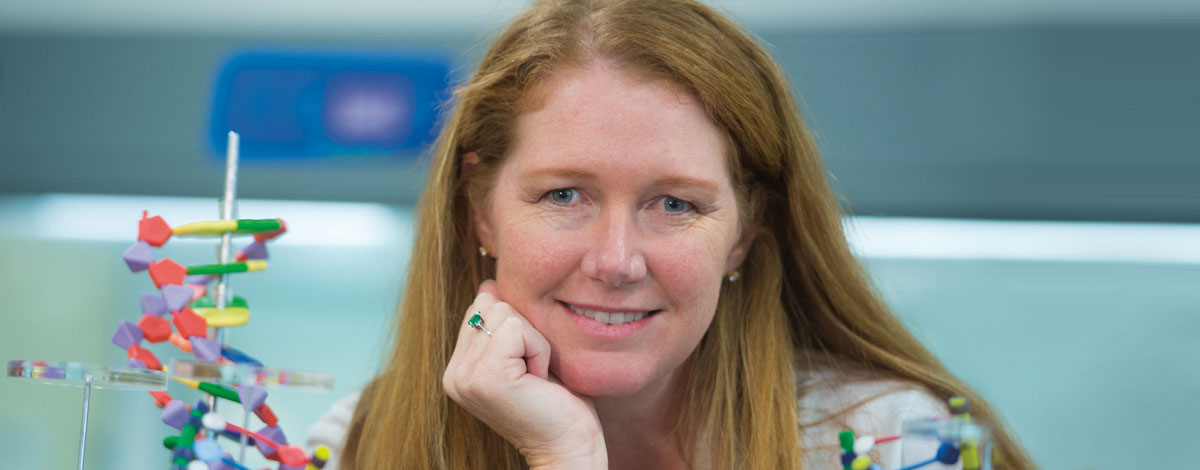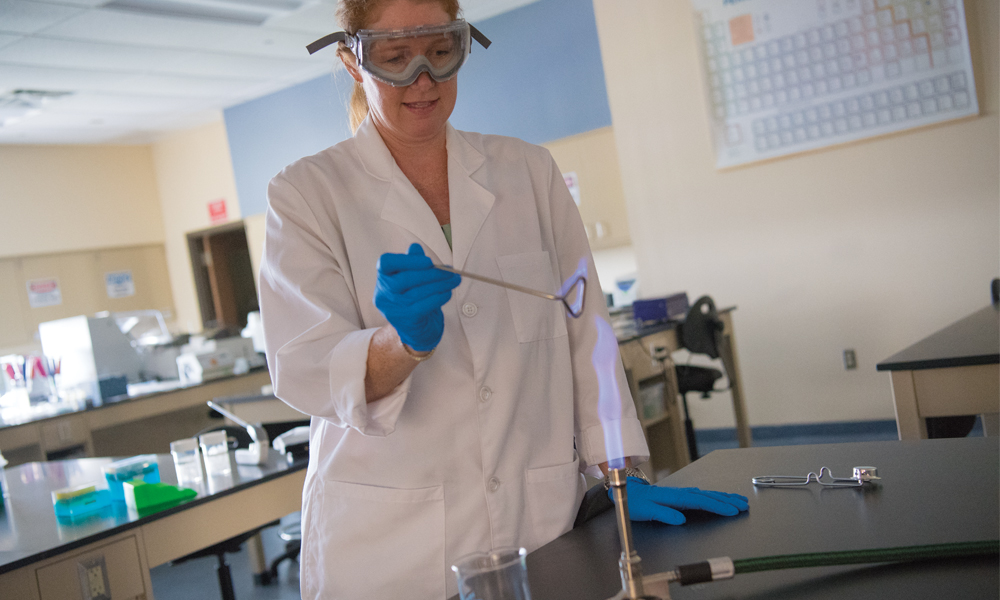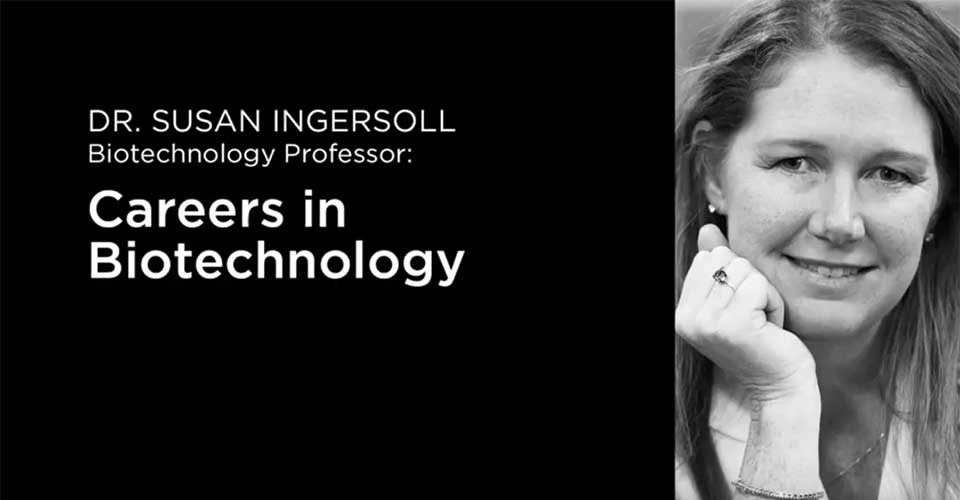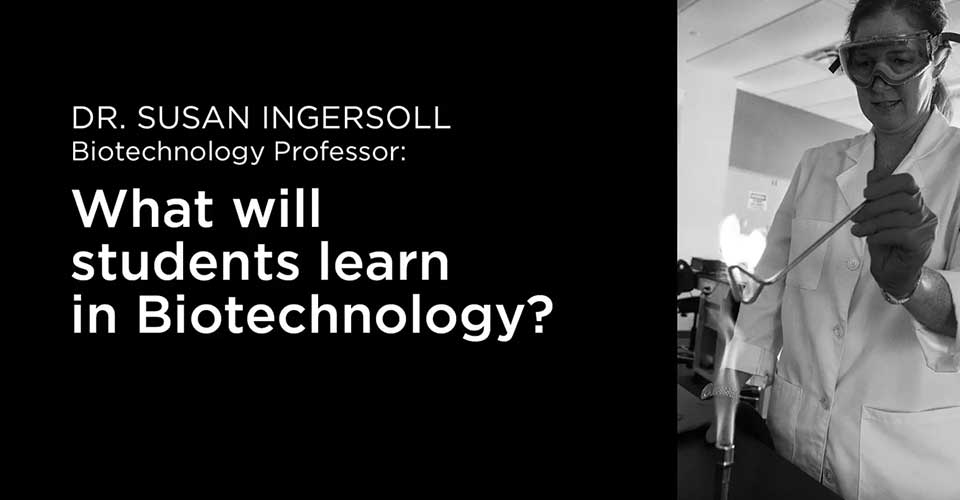
Susan Ingersoll
// BY LINDA SHRIEVES BEATY
When Susan Ingersoll was growing up, she loved hanging around her dad’s medical office, looking through the microscope.
Her father was an Orlando obstetrician and, though she wasn’t really interested in delivering babies, she was keenly interested in science. “Math and science were my favorite classes in school,” says Ingersoll.
So it probably wasn’t surprising that Ingersoll headed to the University of Florida with her eyes on medical school. But after shadowing an orthopedic surgeon and reflecting on her father’s hectic schedule, Ingersoll began to rethink her career plans. Medicine, she thought, might not be a very family-friendly career.
Instead, she decided to pursue a graduate degree in genetics or microbiology, at the suggestion of her mentor, who supervised her undergraduate research. “He steered me in that direction,” she says, and his suggestion clicked. “I fell in love with DNA, molecular biology and genetics.”
But her passion was always in the lab. “I always loved my lab classes. That was my favorite part of all my science classes,” says Ingersoll.
Although most people in her Ph.D. program headed for academic careers, Susan Ingersoll wasn’t sure that was the life she wanted to lead. So instead, she married her college sweetheart, Jim Ingersoll, an Orlando native (and Valencia grad) who was a commercial mortgage banker, and the two settled in Orlando. She landed a job at Florida Hospital, where she began doing cancer research.
“There are a few hospitals that have well-known research programs, such as the Cleveland Clinic and M.D. Anderson, but I was lucky that I found the opportunity at Florida Hospital, so I wouldn’t be forced to move and move and move,” says Ingersoll.
At Florida Hospital, Ingersoll worked on a team that studied how tumor cells invade tissue by activating the clotting system. Five years later, she joined another research team, this time focusing on ovarian cancer.
But when Florida Hospital opted to focus its research teams on diabetes and obesity, Ingersoll faced another crossroads: Should she pursue research or teaching?
Teaching, she realized, was what she was meant to do. “I have friends and colleagues who are professors at UCF. But running their labs and getting research grants is their priority,” she says. “I wanted teaching to be my main focus.”
So in 2014, she started teaching biology as an adjunct at Valencia’s Lake Nona Campus. Today, she’s director of the college’s biotechnology lab sciences program, where she teaches students in the two-year A.S. program the skills they need to work as research lab assistants—jobs that could help them pay their way through more college and could help them pursue graduate degrees in science or medicine.
It’s a natural fit for Valencia’s Lake Nona campus, where students coming out of the program could work as research assistants in Medical City labs or in many of the scientific labs at UCF.
“I love teaching biotechnology. This program is so hands-on. There’s very little lecture. I tell the class, here’s what we’re going to do today. Here’s the theory behind it; now let’s get to it.”
And while college graduates with a bachelor’s or master’s degree in biology learn the theory behind lab techniques, they don’t come out of college with the skills or experience to work in a research lab.
“In those classes, you learn the theory behind it. You learn the process behind it, but you don’t get to perform the procedures,” says Ingersoll. “You may do it once in the lab, but you are not proficient.”
“What sets this program apart is this: The biotech classes are very lab based. Students will be doing small research projects and they’ll be doing these procedures—pipetting, doing DNA extractions, doing PCR redactions—over and over again. So when they finish this A. S. program, they will have all the tools needed to start working a lab very quickly.”
Now Ingersoll is trying to spread the word about the program, which Valencia started in 2015. “I want to target students who want to transfer to a four-year university in a science field or those who want to get lab experience to burnish their resumes for medical school or graduate school,” says Ingersoll.
But there’s another group she’s after—the students who are toiling away in fast-food restaurants or
retail stores to pay their way through college.
“So many of my students work in retail. Instead of working at The Gap or Tropical Smoothie, you
could go through this program and make significantly more at a part-time job than you would at the mall,” she says. “This gives them an employable skill.”
And it may just shine a light on their future.




